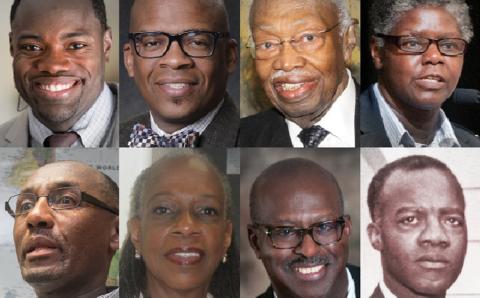Relationship Masters
Last Sunday morning my wife expressed some displeasure with me, and I responded defensively. Tension rose, and I escaped to the family room to read the latest Banner, as I often do before leaving for church. It was folded open to where I had left off the previous Sunday.
Amazingly, the article I was up to and read first was “Becoming Relationship Masters” (Dec. 2017) by Cynthia Kok and Cheryl Cooper. Wow! I heard you, God! Thanks!
This couldn’t have been more timely. When I finished, I rushed to my beloved and told her about the great article that I had already benefited from.
Too bad I didn’t have it several decades ago. At age 80 it really is possible to teach an old dog new tricks.
Kenneth Van Dellen, Grosse Pointe Park, Mich.
Gentiles and Grace
Author Tuininga helpfully points out that we live under grace, not law, and urges the church to listen to gay brothers and sisters (“Gentiles, Homosexuality, and Grace in the Body of Christ,” Dec. 2017). Yet this article ends on a disappointing note. Tuininga does not directly answer whether homosexuality is sexual immorality while hinting that it is. The term homosexuality was not in the Bible until 1946; before then, translators used the term sodomy. The two are not equivalent. The former carries the connotation of violence, abuse, and using others for self-gratification. The Christian Reformed Church will not resolve the same-sex issue until it stops seeing homosexuality as equivalent to sodomy.
Nick Loenen, Richmond, B.C.
What we are seeing in our culture is not new (“Gentiles, Homosexuality, and Grace in the Body of Christ”). It is a battle the church has faced other times in history. It is not some sexual innovation peculiar to our “enlightened age.” It is, in fact, a return to pre-Christian, pagan sexual immorality that characterizes declining cultures.
The church in our day has abandoned its role as salt and light in the culture. Instead of standing firmly on the eternal truths and ordained principles revealed in God’s Word, she has fallen victim to the siren call of postmodernism, allowing the subjectivism of the culture to bully her into irrelevance.
Steve Walker, Salem, Oreg.
Dr. Tuininga’s article “Gentiles, Homosexuality, and Grace in the Body of Christ” (Dec. 2017) raises questions that need answers. When he quotes 1 Corinthians 6:18, for example, the text that commands us to flee from sexual immorality, why are homosexuals singled out? Don’t we all have to flee sexual immorality? Although some homosexuals may well be the depraved individuals Paul references in Romans 1, why do he and others paint all homosexuals with the same brush? Did not God knit all of them together in their mothers’ wombs?
Instead of the continued harping on gay folks (or the exclusion of committed Christian same-sex couples from the full life of the church), why not, for once, turn our attention to the worship of basketball or hockey teams and stars? Or to the continued problem of Internet pornography? And how is it that we continue to attack homosexuality and monogamous same-sex marriages but skip over texts like “Therefore, there is now no condemnation for those who are in Christ Jesus, because through Christ Jesus the law of the Spirit of life set me free from the law of sin and death”?
Frank DeVries, Abbotsford, B.C.
Has Dr. Tuininga never read the CRC’s position on homosexuality, which distinguishes between same-sex attraction and homosexual practice (“Gentiles, Homosexuality, and Grace in the Body of Christ”)? Carefully defining which one you’re talking about makes a world of difference in the conversation and in one’s conclusions. By not doing so, his article creates confusion at best and advocates sin at worst. There is no analogy whatsoever between welcoming repentant Gentiles into the church and welcoming unrepentant sinners into it.
Aaron Gunsaulus, Newton, Iowa
Follow the Body
As I am a newer member of the CRC, Rev. Vander Zee’s article “Follow the Body” (Nov. 2017) answered many of the questions I had after attending a funeral service for one of our beloved church elders. I’ve only attended a few services in the CRC and thought it was a CRC tradition not to have the body present at the service. I was happy to read that it is merely a preference, and he did a wonderful job explaining the reasons for the decision. I found this beautifully written article enlightening and comforting.
Maggie Rhodes, Maple Falls, Wash.
We Need to Talk
“Take your children seriously, show unconditional love . . .” (“We Need to Talk About It,” Nov. 2017). This a powerful statement and so true. As a teenager, I too had thoughts of suicide. I felt that I was never good enough after I was bullied in school and told by one of my parents that I would never make it to college. I battled with those experiences for a long time and came up with suicide plans. If I hadn’t met my husband of 14 years, I probably would have followed through with those plans.
We need to talk to our teens and take them seriously.
Name withheld, Petrolia, Ont.
Unintended Consequences
While reading Harold Hiemstra’s “Unintended Consequences” (Nov. 2017), I was stunned to realize that I could remember the words to “Praise to the Lord, the Almighty.” I’m a millennial and haven’t sung that hymn more than a handful of times in the last decade. The tune was stuck in my head the rest of the day. Good to know it could still be in my head when I’m in the nursing home. If no one else knows it, I guess I’ll just have to teach it so we can sing together.
Steve Roels, Bath, Mich.
A few of us have been holding Sunday afternoon worship services at a local nursing facility for nearly 30 years. So I read with great interest “Unintended Consequences.” The hymnal we use at the center has 134 songs from our Reformed tradition. Two occasions stand out in my memory: three grown daughters in teary-eyed amazement at their hardly-responsive mother with Alzheimer’s singing one of the hymns with a smile on her face, and the testimony of a Catholic nun whose sister passed away after 40 years at the facility. At the gravesite, she asked everyone to sing “Standing on the Promises” because it meant so much to both of them over the years.
Those familiar songs sung over the years can mean so much to so many, young or old, even from traditions other than our own.
Bill Goossens, Tinley Park, Ill.
Correction from CRC Communications:
In the CRCNA Annual Ministry Report inserted in the December issue of The Banner, the expenses for Calvin College should have read $111,949,000 (p. 10). We apologize for the oversight.








